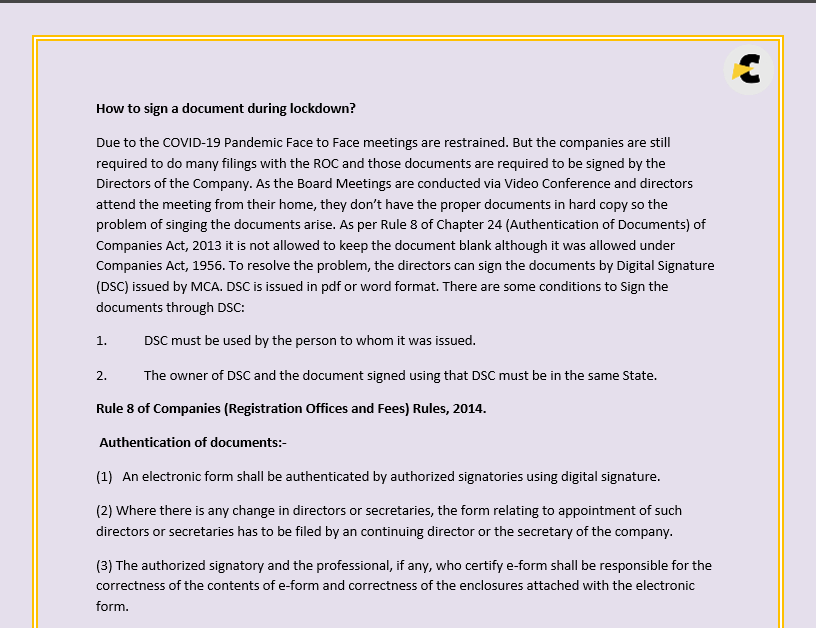How A Director Can Sign A Document During Lockdown?
Table of Contents
How to sign a document during Lockdown?
Due to the COVID-19 Pandemic Face to Face meetings are restrained. But the companies are still required to do many filings with the ROC and those documents are required to be signed by the Directors of the Company. As the Board Meetings are conducted via Video Conference and directors attend the meeting from their home, they don’t have the proper documents in hard copy so the problem of singing the documents arise. As per Rule 8 of Chapter 24 (Authentication of Documents) of Companies Act, 2013 it is not allowed to keep the document blank although it was allowed under the Companies Act, 1956. To resolve the problem, the directors can sign the documents by Digital Signature (DSC) issued by MCA. DSC is issued in pdf or word format. There are some conditions to Sign the documents through DSC:
1. DSC must be used by the person to whom it was issued.
2. The owner of DSC and the document signed using that DSC must be in the same State.
Related Topic:
Advisory for Extension of Validity of Documents till 31 March 2021
Rule 8 of Companies (Registration Offices and Fees) Rules, 2014.
Authentication of documents:-
(1) An electronic form shall be authenticated by authorized signatories using a digital signature.
(2) Where there is any change in directors or secretaries, the form relating to the appointment of such directors or secretaries has to be filed by a continuing director or the secretary of the company.
(3) The authorized signatory and the professional, if any, who certify e-form shall be responsible for the correctness of the contents of e-form and correctness of the enclosures attached to the electronic form.
(4) Every person authorized for authentication of e-forms, documents or applications, etc., which are required to be filed or delivered under the Act or rules made thereunder, shall obtain a digital signature certificate from the Certifying Authority for the purpose of such authentication and such certificate shall not be valid unless it is of class II or Class III specification under the Information Technology Act, 2000 (21 of 2000).
(5) The electronic forms required to be filed under the Act or the rules thereunder shall be authenticated on behalf of the company by the Managing Director or Director or Secretary of the Company or other key managerial personnel.
(6) A scanned image of documents shall be of original signed documents relevant to the e-forms or forms and the scanned document image shall not be left blank without bearing the actual signature of the authorized person.
Related Topic:
Signing of Documents Digitally by a Director
(7) It shall be the sole responsibility of the person who is signing the form and professional who is certifying the form to ensure that all the required attachments relevant to the form have been attached completely and legibly as per provisions of the Act, and Rules made thereunder to the forms or application or returns filed.
(8) The documents or form or application filed may contain a power of attorney issued to an Advocate or Chartered Accountant or Cost Accountant or Company Secretary who is in whole-time practice and to any others person supported by Board resolution to make representation to the registering or approving authority failing which a Director or key managerial personnel can make a representation before such authority.
(9) Where an instance of filing document, application or return, etc., containing false or misleading information or omission of material fact, requiring action under section 448 or section 449 is observed, the person shall be liable under section 448 and 449 of the Act.
(10) Without prejudice to any other liability, in case of certification of any form, document, application or return under the Act containing wrong or false or misleading information or omission of material fact or attachments by the person, the Digital Signature Certificate shall be de-activated by the Central Government till a final decision is taken in this regard.
(11) The Central Government shall set up and maintain for filing of electronic forms, documents, and applications, and for viewing and inspection of documents in the electronic registry or for obtaining certified copies thereof-
(a) a website or portal to provide access to the electronic registry; and
(b) as many Registrar’s Facilitation Offices as may be necessary and at such places and for such time as the Central Government may determine.
Related Topic:
Difference Between Director & Additional Director









